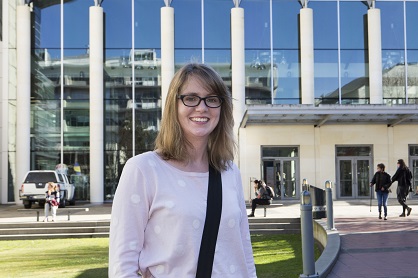
After several years working as a pharmacist, clinical editor and research assistant Amber Young is now a PhD candidate. Photo credit Rewa Pene
“I had doubts as to whether I was able to do this level of study, but everyone has been really supportive which makes it so easy and I'm enjoying it so much.” PhD candidate Amber Young
Growing up, Amber Young was interested in science, health and helping people, attributes that remain with her today as she juggles roles as a PhD candidate, research assistant and clinical editor of the New Zealand Formulary.
“I was always interested in science, health and helping people and pharmacy allowed me to put together my interests with the opportunity to travel,” she recalls thinking back to the reasons why she initially trained as a pharmacist, graduating with a BPharm with credit at the University of Otago in 2003.
After a successful career as a hospital and community pharmacist, both in New Zealand and the UK, and as a clinical editor for both the British National Formulary and now the New Zealand equivalent, Amber is this year returning to the classroom.
Her interests again came to the fore as her research centres around communication between pharmacists, general practitioners and their patients.
Her research is three-fold as she looks to assess whether patient medicines information leaflets supplied by healthcare professionals enable patients to easily find and understand information. Currently she is applying for ethics approval to examine pharmacists and GPs' medication counselling practices and their use of written information in their practice, while the third phase will see her develop and evaluate tools they can use containing medication counselling information.
“What I want to know is what is everyone doing in their practice at the moment? Is everyone doing the same thing, or are they doing things differently?
“There's not a lot of guidance about who should be giving what information and what is best for patients.”
Most patients want to know about the side-effects of medicines yet, research carried out in Australia shows most healthcare professionals do not think people should know about the side-effects, Amber says.
“I started off looking at it from my own personal experience of going to the doctor or a pharmacy and information I get as a patient.”
Amber initially worked as a community pharmacist in Dunedin and began further studies, graduating with a Postgraduate Certificate in Pharmacy in 2005. Travel then beckoned and she headed off to the UK where she worked in both community and hospital pharmacy.
“It was a bit of a culture shock starting hospital pharmacy, as you are much closer to the action and part of the team, you are working with the doctors at the patient's side.”
For more than three years at St George's Healthcare NHS Trust, she experienced working in a wide range of areas including trauma and orthopaedic surgery, care of the elderly and cardio-thoracic surgery.
But by 2010 it was time for something completely different and Amber took up a role as staff editor at the British National Formulary, assisting in reviewing and updating the formulary's content. While she missed the patients, she relished the opportunity to combine her interests of writing and science, a role she is lucky enough to continue today in a part-time role as clinical editor of the New Zealand Formulary.
She also juggles another part-time job as research assistant at the School of Pharmacy, under the supervision of research fellow Alesha Smith. While the idea of beginning her PhD studies had been in the back of Amber's mind, she admits to having reservations as to whether she would be able to undertake it, but with Dr Smith's support has taken the bold step to do so.
“I had doubts as to whether I was able to do this level of study, but everyone has been really supportive which makes it so easy and I'm enjoying it so much.”
Amber considers the fact she is investigating an area she is interested in is a big advantage.
“The social pharmacy aspect of my research really interests me, making the study enjoyable and I look forward to learning more in this area.”
Written by Liane Topham-Kindley for Pharmacy Today, October 2016